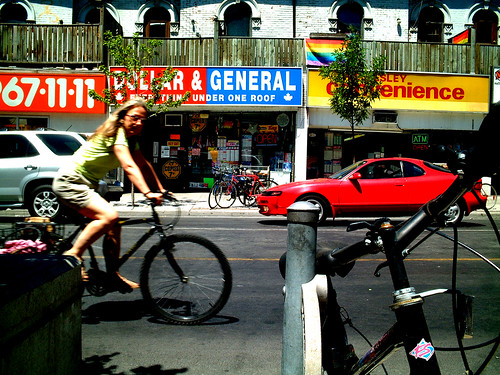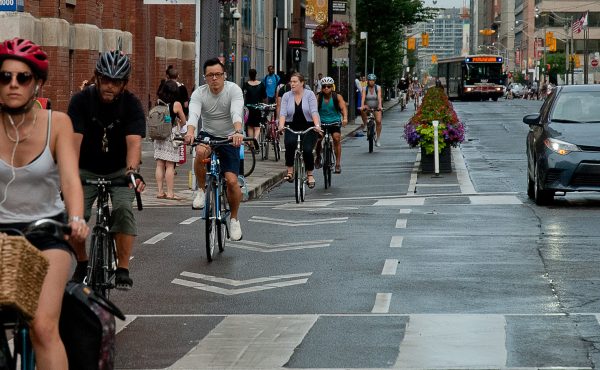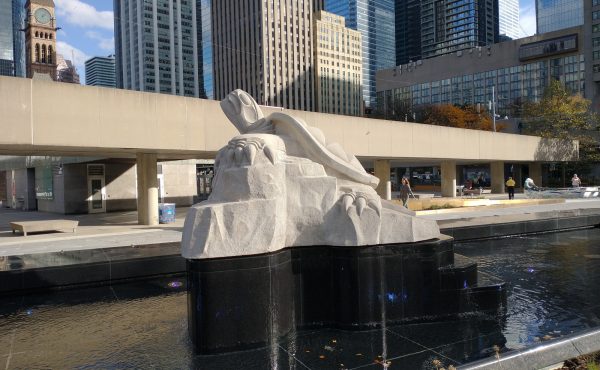
Paving bike lanes with good intentions
It isn’t often that people in Toronto pine for the days of former Mayor Mel Lastman, but take a look at Mayor David Miller’s track record on building new bike lanes and you may find yourself fighting a bout of nostalgia. Good ol’ Megacity Mel managed to create twice as many bike lanes as our current bike-friendly mayor, who saw a mere 26 kilometres implemented over the past three years.
“All the easy parts were done before I was mayor,†said Miller in his defence to a crowd filled with a number of people ringing bike bells and holding up “Take the Tooker†signs at the Political Party, the mayoral event held by Eye Weekly and Spacing magazine prior to November’s municipal election. “My approach was to significantly increase investment in the Bike Plan,†said Miller, “but it didn’t work. And one of the reasons it didn’t work was because of determined fights by opponents of bike lanes.â€
Lesson learned: throwing money at the Bike Plan won’t do any good if councillors, such as notable lane-killer Case Ootes, are going to stand in the way. The Ooteses on council will have a harder time, however, now that the rules have changed, giving community councils the power to approve bike lanes, but not the power to shoot down motions to build them.
Which brings me to this year’s budget. During his campaign, Miller also said this: “Next year, the bicycle infrastructure budget will double to $6.2 million.â€
The number earmarked for bike lanes in this year’s proposed budget? $3 million — that’s a zero per cent increase from 2006. On top of that, the budget recommends a 20 per cent cut to the cash allocated for bike trails in Toronto parks, with zero funds set aside to ensure bike paths be kept in a state of good repair.
What gives? In addition to Miller’s enthusiastic support for bike lanes at campaign time, each and every one of the councillors now on the budget committee said they would support spending $6 million on bike lanes and $1.5 million on new and upgraded bike paths for parks in a survey organized by the Toronto Coalition for Active Transportation (TCAT) prior to the election. Like Miller, they’ve also changed their tune. Council meets for final consideration of the budget until March 7, which leaves plenty of time for phone calls and letters asking council to live up to its promises.
Valentine’s Day silent treatment
I settled myself down in council chambers on Valentine’s Day expecting a long, romantic afternoon of listening to deputations from the public on the capital budget. This was, after all, the time set aside for public comment, and if there’s one thing I’ve learned from attending public forums and the like, it’s that the public loves to comment. To my surprise, only eight of Toronto’s 2.5 million people had signed up to speak. Public consultation on plans that will, in large part, determine what the sixth largest government in Canada accomplishes this year was all over in less than an hour.
photo form Biking Toronto





15 comments
Dale, I don’ mean to be a jerk but you’re the one with the pen, paper and a column, why don’t you take the mayor and Budget Committee members to task? They certainly deserve it.
As for the capital budget deputations…They’re never a big selling point for the public. When Council did capital and operating side-by-side people would be more likely to comment on both since they’d already made the trip for operating but that’s no longer the process. Plus there aren’t many folks who have the flexibility in their schedules to pop in for their 5 minutes on the floor. And then add to that the crappy weather conditions on Valentine’s Day and 8 is more than I expected (since “stakeholders” had their own session a day earlier.)
Didn’t she just do that though? It’s the writers job to point things out, open things up, say what’s wrong. But one writer does not equal political pressure — that still comes from the people.
No, Shawn, she didn’t.
She should have actually put the question to the mayor and/or committee members and published their answer(s).
The answer(s) may be a piss poor excuse or it could be that staff don’t believe that they’re in a position to spend more than $3 million in 2007 because of the approvals processes required or not having enough staff to do the work or some other reason.
Either way, the question ought to have been asked and answered in the column because right now there’s the impression that the mayor and budget committee have, without cause, broken a pretty substantial promise. Readers deserve to know why (or know that the politicians were unwilling to respond). Moreover, the mayor and councillors involved deserve a voice in the column since there was the suggestion that they weren’t delivering on the mandate they were sent to City Hall with.
…And no column should, could or would replace the necessity of grassroots involvement in the political process.
Does anyone else think the offensive thing here is that hiedous streetscape with its ugly commercial signs? Ew. Church-Wellesley is looking worse every year..
Adam > You’re right. Readers should know why the mayor and councillors on the budget committee broke their promise. I’d like to investigate this, and when I get some answers, I’ll let you know, either on the wire or in the Eye Weekly column.
This doesn’t change the fact that promises were broken, however. The election was in November, and up until then, the mayor was promising $6.2 million for the bike plan. This was published on his campaign website. Here we are, a mere three months later, and it’s as though that number has been completely forgotten. If dedicating $6.2 million was going to be difficult, you’d think the mayor would have had some inclination that that’d be the case three months ago.
I think readers “deserved” to know that this promise was made and not kept.
As for the budget meeting, I don’t blame citizens for not showing up to the meeting. You’re right. It’s not so easy to trek to city hall in the middle of the day (when many people have to work) and in the middle of bad weather to state your opinion on the budget. I think it’s terrible that the city doesn’t make it easier for the public to participate. This is the point I was trying to make. The city made little effort to get the word out that last thursday was the day for the public to make deputations. Of the eight people that were on the list, one didn’t show up, two were politicians (MPP Cheri Dinovo, and Catholic School Board Trustee Oliver Carol), three were cycling advocates (who received notice of the meeting a couple days before when one well-organized bike activist sent around an email encouraging them to depute), and one was a ciy hall regular (the kind of guy who spends all his free time pouring over agendas and attending every meeting and forum he can manage).
Eight people may well be a lot given the circumstances, but it’s not good enough, and the city should do something about it.
It’s hard to believe that only 50km or so of Toronto roads Lastman built on were “easy” to put bike lanes on due to layout but more because of the heavy hand of Roads at work again as on St. Clair. In a city this big there should be ample room to spend the bike budget in wards other than 29 and simply wait Ootes out while doing so. But this is the left wing at work looking to stick it to Ootes and would rather have the fight than build the lanes and have the residents of 29 then demand their own given the glowing success of their neighbours’ ones.
As for the budget process, even with his picked squad the Mayor can’t find the money for a specific platform promise. I wonder if the right-wing proposal for zero budgeting looks nicer now that the increment and hope approach has been shown up by the Staff’s actions as a failure.
Speaking of Ootes, bikes et al, here’s a fun quote from today’s Globe and Mail:
‘Mr. Ootes fears the mayor’s climate-change plan will include measures to “do things that are popular but not cost-effective,” including what he called expensive bike lanes or parking fees to penalize big cars.’
He obtained an Master of Business Administration degree from York University, and served several years as an executive with Imperial Oil. At Imperial Oil, he became friends with Dave Johnson, and when Johnson became involved in Tory politics so did Ootes. From wikipedia.
I would like to say it is great that on my 20 k a day bike in the city I get a bout .5 of that a lovely bike lane its like a dreamy one minute then back to hell:)
Is 6 mill alot cause it sounds like peanuts.
Thanks for all this.
With respect, it can also be a ? of effectiveness, not just the sums spent. My fave is a Bloor bikeway, which would be a $200,000K spending on repainting the street from Sherbourne to High Park giving 8km of bike lane adjacent to massive transit – the subway. Not that the way we do our bike lanes means that they actually work, but it’s a start.
One real shame is the demise of the Yellowbike program – and with the Mayor’s office renos etc., it shows yet again, the money is there, it’s the priorities. Sigh, but thanks Magosha et al for doing what you’ve done.
h
Bike lanes need physical separation from car lane.
Or they just aren’t safe. Cars/taxis will pull over into the bike lane, etc. A bike lane guarded by a yellow line is useless!
Hamish, I don’t know much about the Yellowbike program but that sounds like an operating expenditure, not capital.
Yes, sometimes I’m a deliberate simpleton in that I think a tax dollar is a tax dollar. I may not be alone
Tiding bikeshare over would have represented an investment in clean air and mobility for the poor.
I think we need a discussion about bike lanes. If they don’t have a barrier, will they work? If they do have a barrier, will they get plowed in the winter? We already have bike routes, almost all with those “No Winter Maintenance” signs.
I would argue that we need to get out on the roads and assert our rights as road users/vehicles at every possible opportunity. To that end, I recommend three things. Push the attorney general to set a policy of pressing charges against the harassment of cyclists on the street; that means an explicit policy that if a motorist harassing a cyclist causes injury or death, prosecutors will treat their offense as though they had committed it with a switchblade. Go to the police services board to get more officers on bikes, and more resources dedicated to investigating crimes of all types against cyclists. Make all of the traffic calming measures in Toronto bike friendly, which means bike gates through those bouldered streets in the annex, two-way bike lanes on the one way streets, and at least one street per neighbourhood where bikes can go straight through, including special four-way stops which do not apply to cyclists.
Thank you, Dale, for nailing it and telling the full story of how Mayor David Miller and City Council are not only underreaching in terms of a green vision for Toronto – they’re actually backpedalling on basic promises! Keep up the great work.
Hamish, a tax dollar is a tax dollar but if you’re going to argue that capital projects should be funded with operating dollars then you’ll never get anywhere. When the operating budget is up for discussion then propose which budget lines you would take from in exchange for this program and it may well gain support. But tying an operating expenditure to the capital budget is rather deceptive because even if Council wanted heed your request it couldn’t happen until they consider the operating budget.
Also, in this week’s NOW Gord Perks explains why more money isn’t being spent on bike lanes:
“The stalling of the Bike Plan hasn’t been a money problem,” says Gord Perks, who points instead to the lack of planners. “Last year we could have shown up with wheelbarrows of money and no more would’ve been done.”
The article goes on to say that Miller & Co. will put more money to hire planners into the operating budget.
If this is the case then the balance of the $6.2 million that was promised for bike infrastructure may be used to hire the additional planners that can make bike lanes happen this year and in future years. If that’s Miller’s intention then it is a broken promise since the wording was “bicycle infrastructure” and planning staff, while important, isn’t infrastructure.
But I wouldn’t be inclined to hold it against Miller for too long since hiring the staff is what is required to action the bike plan.